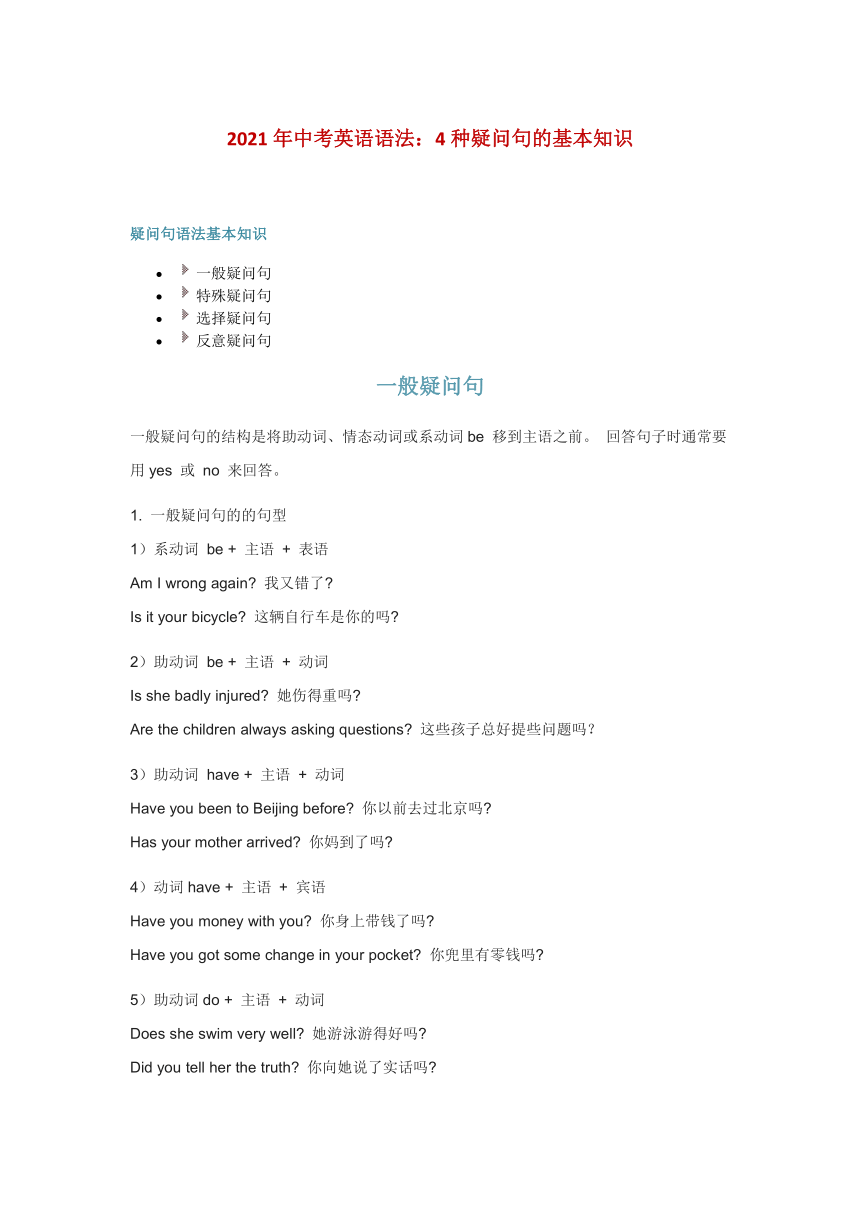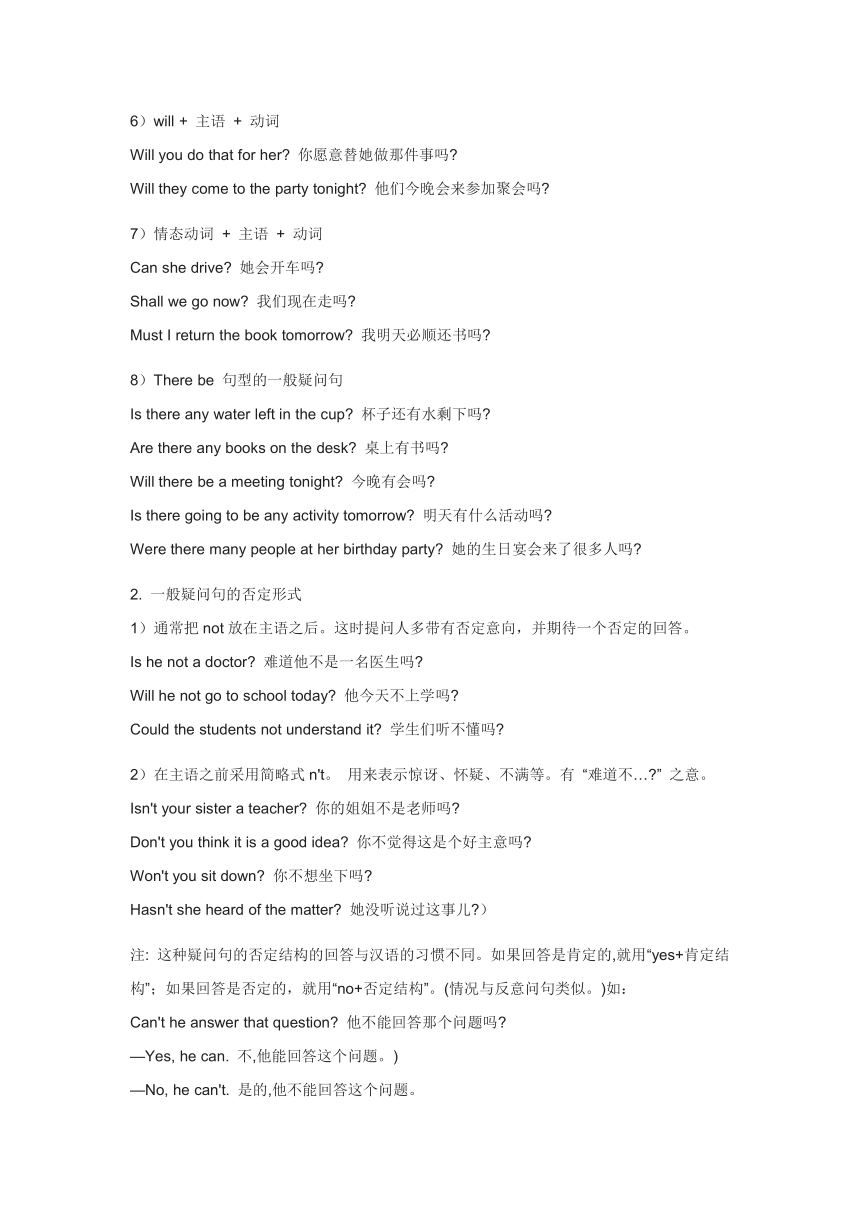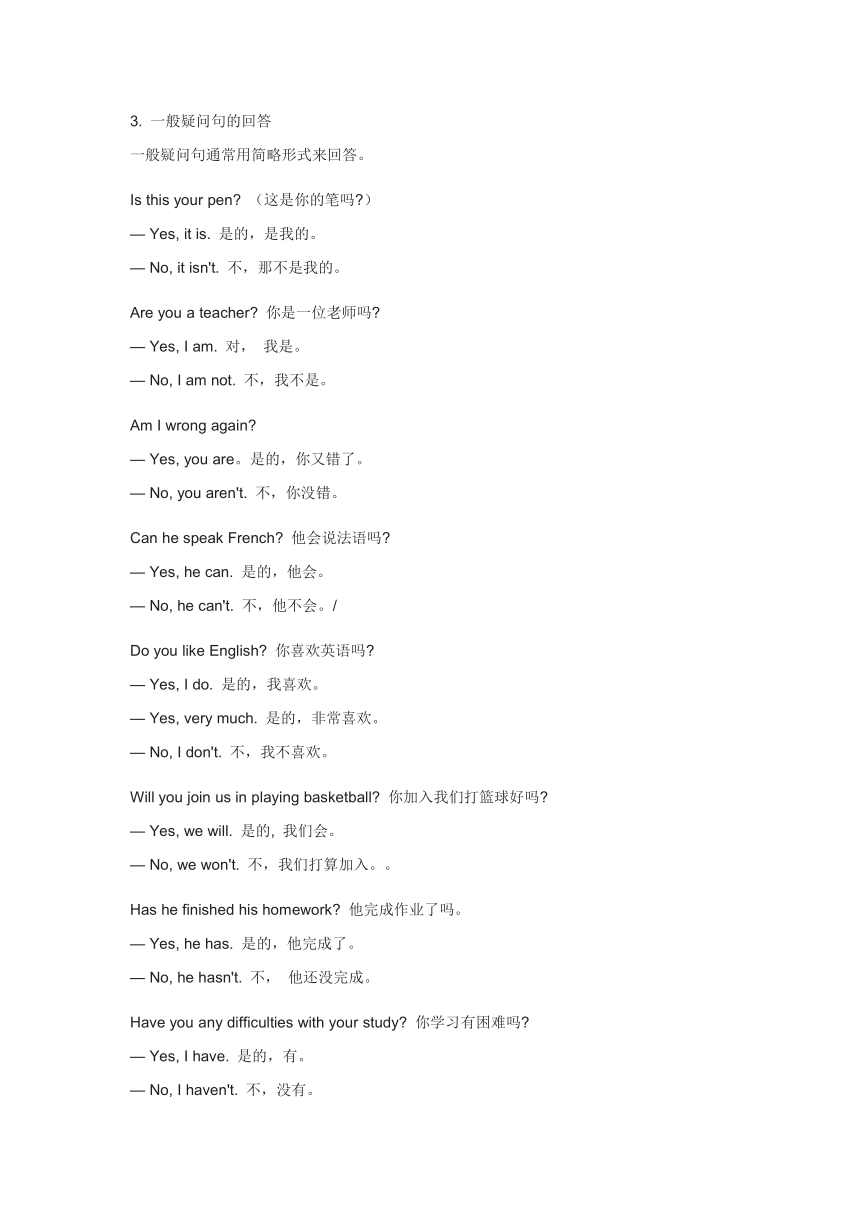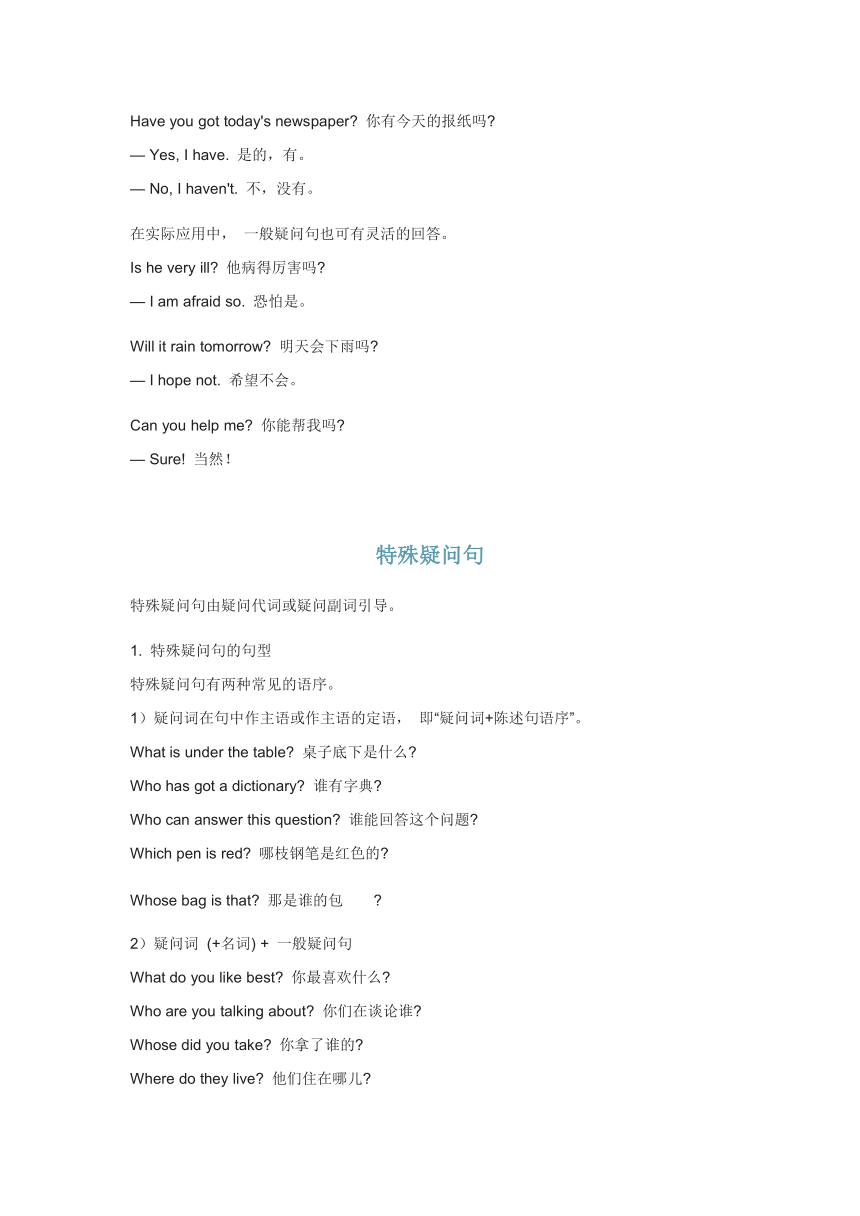2021年中考英语语法:4种疑问句的基本知识
文档属性
| 名称 | 2021年中考英语语法:4种疑问句的基本知识 |

|
|
| 格式 | zip | ||
| 文件大小 | 23.3KB | ||
| 资源类型 | 教案 | ||
| 版本资源 | 通用版 | ||
| 科目 | 英语 | ||
| 更新时间 | 2021-04-28 22:31:38 | ||
图片预览




文档简介
2021年中考英语语法:4种疑问句的基本知识
疑问句语法基本知识
?一般疑问句
?特殊疑问句
?选择疑问句
?反意疑问句
一般疑问句
一般疑问句的结构是将助动词、情态动词或系动词be
移到主语之前。
回答句子时通常要用yes
或
no
来回答。
1.
一般疑问句的的句型
1)系动词
be
+
主语
+
表语
Am
I
wrong
again?
我又错了?
Is
it
your
bicycle?
这辆自行车是你的吗?
2)助动词
be
+
主语
+
动词
Is
she
badly
injured?
她伤得重吗?
Are
the
children
always
asking
questions?
这些孩子总好提些问题吗?
3)助动词
have
+
主语
+
动词
Have
you
been
to
Beijing
before?
你以前去过北京吗?
Has
your
mother
arrived?
你妈到了吗?
4)动词have
+
主语
+
宾语
Have
you
money
with
you?
你身上带钱了吗?
Have
you
got
some
change
in
your
pocket?
你兜里有零钱吗?
5)助动词do
+
主语
+
动词
Does
she
swim
very
well?
她游泳游得好吗?
Did
you
tell
her
the
truth?
你向她说了实话吗?
6)will
+
主语
+
动词
Will
you
do
that
for
her?
你愿意替她做那件事吗?
Will
they
come
to
the
party
tonight?
他们今晚会来参加聚会吗?
7)情态动词
+
主语
+
动词
Can
she
drive?
她会开车吗?
Shall
we
go
now?
我们现在走吗?
Must
I
return
the
book
tomorrow?
我明天必顺还书吗?
8)There
be
句型的一般疑问句
Is
there
any
water
left
in
the
cup?
杯子还有水剩下吗?
Are
there
any
books
on
the
desk?
桌上有书吗?
Will
there
be
a
meeting
tonight?
今晚有会吗?
Is
there
going
to
be
any
activity
tomorrow?
明天有什么活动吗?
Were
there
many
people
at
her
birthday
party?
她的生日宴会来了很多人吗?
2.
一般疑问句的否定形式
1)通常把not放在主语之后。这时提问人多带有否定意向,并期待一个否定的回答。
Is
he
not
a
doctor?
难道他不是一名医生吗?
Will
he
not
go
to
school
today?
他今天不上学吗?
Could
the
students
not
understand
it?
学生们听不懂吗?
2)在主语之前采用简略式n't。
用来表示惊讶、怀疑、不满等。有
“难道不…?”
之意。
Isn't
your
sister
a
teacher?
你的姐姐不是老师吗?
Don't
you
think
it
is
a
good
idea?
你不觉得这是个好主意吗?
Won't
you
sit
down?
你不想坐下吗?
Hasn't
she
heard
of
the
matter?
她没听说过这事儿?)
注:
这种疑问句的否定结构的回答与汉语的习惯不同。如果回答是肯定的,就用“yes+肯定结构”;如果回答是否定的,就用“no+否定结构”。(情况与反意问句类似。)如:
Can't
he
answer
that
question?
他不能回答那个问题吗?
—Yes,
he
can.
不,他能回答这个问题。)
—No,
he
can't.
是的,他不能回答这个问题。
3.
一般疑问句的回答
一般疑问句通常用简略形式来回答。
Is
this
your
pen?
(这是你的笔吗?)
—
Yes,
it
is.
是的,是我的。
—
No,
it
isn't.
不,那不是我的。
Are
you
a
teacher?
你是一位老师吗?
—
Yes,
I
am.
对,
我是。
—
No,
I
am
not.
不,我不是。
Am
I
wrong
again?
—
Yes,
you
are。是的,你又错了。
—
No,
you
aren't.
不,你没错。
Can
he
speak
French?
他会说法语吗?
—
Yes,
he
can.
是的,他会。
—
No,
he
can't.
不,他不会。/
Do
you
like
English?
你喜欢英语吗?
—
Yes,
I
do.
是的,我喜欢。
—
Yes,
very
much.
是的,非常喜欢。
—
No,
I
don't.
不,我不喜欢。
Will
you
join
us
in
playing
basketball?
你加入我们打篮球好吗?
—
Yes,
we
will.
是的,
我们会。
—
No,
we
won't.
不,我们打算加入。。
Has
he
finished
his
homework?
他完成作业了吗。
—
Yes,
he
has.
是的,他完成了。
—
No,
he
hasn't.
不,
他还没完成。
Have
you
any
difficulties
with
your
study?
你学习有困难吗?
—
Yes,
I
have.
是的,有。
—
No,
I
haven't.
不,没有。
Have
you
got
today's
newspaper?
你有今天的报纸吗?
—
Yes,
I
have.
是的,有。
—
No,
I
haven't.
不,没有。
在实际应用中,
一般疑问句也可有灵活的回答。
Is
he
very
ill?
他病得厉害吗?
—
I
am
afraid
so.
恐怕是。
Will
it
rain
tomorrow?
明天会下雨吗?
—
I
hope
not.
希望不会。
Can
you
help
me?
你能帮我吗?
—
Sure!
当然!
特殊疑问句
特殊疑问句由疑问代词或疑问副词引导。
1.
特殊疑问句的句型
特殊疑问句有两种常见的语序。
1)疑问词在句中作主语或作主语的定语,
即“疑问词+陈述句语序”。
What
is
under
the
table?
桌子底下是什么?
Who
has
got
a
dictionary?
谁有字典?
Who
can
answer
this
question?
谁能回答这个问题?
Which
pen
is
red?
哪枝钢笔是红色的?
Whose
bag
is
that?
那是谁的包?
2)疑问词
(+名词)
+
一般疑问句
What
do
you
like
best?
你最喜欢什么?
Who
are
you
talking
about?
你们在谈论谁?
Whose
did
you
take?
你拿了谁的?
Where
do
they
live?
他们住在哪儿?
How
old
are
you?
你多大了?
How
do
you
know
about
it?
你是怎么知道这件事的?
Why
are
you
late
again?
你怎么又迟到了。
Which
book
do
you
like?
你喜欢哪一本书?
What
time
will
we
go?
我们什么时候走?
2.
特殊疑问句的一些特殊句式
1)
“why
+
动词”
或
“why
+
not
+
动词”
Why
not
sent
a
message
to
me
on
the
net?
何不在网上把信息传给我呢?
Why
risk
breaking
the
law?
为什么要冒险违法?
2)
疑问代(副)词之后可插入一些用于加强语气的词语,
如:
ever,
exactly,
in
heaven,
in
hell,
on
earth,
the
hell
等。
What
on
earth
do
you
want?
你到底想要什么?
Who
ever
told
you
that?
到底是谁告诉你那件事。
3)特殊疑问句有时采用省列形式,
特别是在口语中。
“He
won't
come.”
“Why?”
“他不来了。”
“为什么?”
“There's
someone
coming.”
“Who?”
“有人要来。”“谁?”
What
next?
还要什么?
“I
am
writing
a
letter?”
“Who
to?”
“我在写一封信。”
“给谁?”
4)其他一些特殊疑问句的结构。
a)
How
about
+
名词/动名词?
用于提出建议、征求意见等。
其意思为“…怎么样?”
“…行吗?”
How
about
next
Saturday?
下周六如何?
How
about
having
some
coffee?
要不要喝点咖啡?
b)
How
come…?
用于询问。
其意思为
“…怎么会….?”
“…为什么…?”
How
come
he
never
got
married?
为什么他不结婚?
You
were
an
hour
late
this
morning.
How
come?
今天早晨你迟到了一小时。怎么回事?
c)
What
about
+名词/动名词?
用于提出建议、征求意见等。
其意思为“…怎么样?”
What
about
the
salary?
薪水怎么样?
What
about
having
a
rest?
休息一会儿怎么样?
d)
What
do
you
think
of/about
+
名词?
用于征求意见,
意思为
“你觉得…怎么样?”
What
do
you
think
of
life
in
Beijing?
您觉得北京的生活怎么样?
What
do
you
think
about
the
report
I
am
writing?
你认为我在写的这篇报告怎么样?
e)
What
if…?
意思为
“要是...该如何?”,”万一...怎么办?”,”如果...怎么办?”。
What
if
the
rumour
is
true?
万一谣传真有其事呢?
What
if
we
can't
tie
the
tie?
如果我们弄不好领结怎么办?
选择疑问句
选择疑问句是在疑问句中加入or
或者
or
not,
提供两个或两个以上的选择。
Do
you
like
to
play
football
or
basketball?
你喜欢踢足球还是打篮球?
Shall
we
walk,
or
shall
we
go
by
bus?
咱们步行去,还是乘公共汽车去?
Are
you
going
shopping
or
not?
你到底去购物还是不去?
Are
you
coming
or
not?
你来还是不来?
反意疑问句
反意疑问句的句型一般为:
陈述句
+
逗号
+
助动词/情态动词
(+
not)
+
代词(或there)。其中的not要用缩写。这种句式采用了先进行陈述,然后通过附加疑问的方式来表达希望对方加以证实或同意的语气。其意思可译为“是不是?”,“对不对?”,“好不好?”。
反意疑问句的
“反意”是指当前边陈述部分为肯定时,后面的疑问部分要用否定。而当前边的陈述部分为否定时,后面疑问部分要采用肯定。
You?are
not?going
out
today,?are
you?
今天你不出去,
对吗?
You?know?the
meaning
of
the
word,?don't
you?
你知道这个单词的意思,
是不是?
He?has?finished
his
homework,?hasn't
he?
他做完作业了,对不对?
He?doesn't?have
any
money,?does
he?
他没有钱,是吗?
There?is?a
boat
on
the
river,?isn't
there?
河上有一只船,
不是吗?
We?must?try
to
get
the
work
done
today,?mustn't
we?
我们今天必顺完成这项工作,
对不对?
He?can?do
this,?can't
he?
他能够做这个,是不是?
在回答反意疑问句时,
肯定的回答用yes,
后跟相应的肯定陈述。
否定回答用no,
后跟相应的否定陈述。
It's
very
hot
today,
isn't
it?
今天天气很热,是不是?
--
Yes,
it
is.
是的,很热。
--
No,
it
isn't.
不,今天不热。
注意,即使反意疑问句的陈述部分为否定句,
在回答时仍然按照以上的方法进行回答。
即如果答案是肯定的,则用yes,
如果答案是否定的,则用
no。
这与汉语的语言习惯不同。
You
won't
have
time
to
go
to
London,
will
you?
--
Yes,
I
will.
不,
我有时间去。
--
No,
I
won't.
是的,我没时间去。
反意疑问句的用法上要注意以下几点。
1
当前边陈述部分为肯定时,后面的疑问部分要用否定。而当前边的陈述部分为否定时,后面疑问部分要采用肯定。
2
疑问句所采用的助动词或情态动词要与陈述部分中采用的助动词或情态动词相对应。
3
当陈述部分含有否定词时,附加的疑问部分要用肯定形式。
为些否定词包括
hardly,
rarely,
seldom,
few,
little,
no,
never,
nothing,
nobody,
nowhere
等。
He?never?tells
a
lie,?does
he?
他从不说慌,是吗?
Nothing?is
difficult,?is
it?
没什么难的事情,不是吗?
Few?people
know
him,?do
they?
几乎没有人认识他,是吗?
4
祈使句的附加问句通常用
will
you?,
shall
we?
或
won't
you?,
shan't
we?。
有时也可用
can
you?
或
can't
you。
Stop
talking,?will
you?
停止说话,好吗?
Don't
be
late,?will
you?
不要迟到,好吗?
Try
to
be
back
earlier,?won't
you?
设法早点回来,好吗?
Let's
do
it
together,?shall
we?
我们一起做这件事,好吗?
Walk
faster,?can't
you?
走快点,不行吗?
注意:
祈使句的反意疑问句,若前面的陈述部分是否定结构,
则附加问句只能用
will
you。不能用
shall
we/shan't
we/won't
you/can
you/can't
you
等。如:
Don't
forget
to
post
the
letter,?will
you.
别忘了寄信,好吗?
Don't
be
late,?will
you?
不要迟到,好吗?
5
情态动词的反意疑问句需要注意以下情况:
1)
当陈述部分用情态动词为must
时,附加疑问句可以用mustn't
或
needn't。
You
must
do
it
by
yourself,?mustn't
you?
你必须独立做这件事,是不是?
He
must
meet
with
Professor
Smith
before
he
starts
his
project,?needn't
he?
他在开始项目之前必须和斯密斯教授面谈,是不是?
注意:当
must
表示逻辑推断,表示“一定”“想必”的意思时,反意部分应与must后的动词相对应。如:
She
must
be
ill,?isn't
she?
她一定是病了,是不是?
2)当陈述部分用情态动词used
to
时,附加疑问句可以用
usedn't,
也可以用
didn't。
He
used
to
get
up
late,?usedn't
he?
他过去常常很晚起床,是吗?
He
used
to
go
to
school
by
bike,?didn't
he?
他过去常常骑单车上学,是吗?
3)当陈述部分用情态动词
ought
to
时,其后反意疑问句用oughtn't或shouldn't均可。如:
I
ought
to
go
there,?oughtn't
I?
我应该去那儿,是吗?
You
ought
to
go
by
ship,?shouldn't
you?
你应该坐船去,是吗?
4)
当陈述部分用情态动词
had
better
(或
had
best)
时,其后反意疑问句用had。如:
We
had
better
do
it
by
ourselves,?hadn't
we?
我们最好靠我们自已做,好吗?
You'd
better
not
stay
here,?had
you?
你最好不要呆在这儿,好吗?
5)
陈述部分含有have/has/had
to时,其后的反意疑问句用do的相应形式。如:
You
have
to
go,?don't
you?
你必顺走是吗?
He
has
to
stay
in
bed
all
day,?doesn't
he?
他不得不整天趟在床上,是吗?
但是在陈述句中用have/has/had
got
to来代替have/has/had
to时,反意疑问句用have的相应形式。如:
He
has
got
to
see
a
doctor,?hasn't
he?
他不得不去看医生,
是吗?
You
haven't
got
to
go
to
school
on
Sunday,?have
you?
你周日必顺去学校,是吗?
6
复合句的反意疑问句
1)多数复合句后的反意疑问句应保持与主句的主、谓语一致。如:
Peter
said
she
was
a
teacher,?didn't
he?
彼得说她是一位老师,是吗?
You
don't
mind
if
I
go
now,?do
you?
你不会介意我现在走,对吧?
2)
当宾语从句的否定前移时,反意疑问句一般与宾语从句一致。
I?don't
believe?the
boy?is?killed
by
Jim,?is
he?
我认为那个男孩不是吉姆所杀的,是不是?
7
反意疑问句的其它特殊情况
1)
当陈述句部分是
I'm….
时,
附加疑问句通常用
aren't
I。
I
am
a
good
man,?aren't
I?
我是一个好人,是吗?
2)
当陈述句部分是
I
wish…
时,
附加疑问句通常用
may
I。
I
wish
to
go
with
them,?may
I?
我想同他们一起去,可以吗?
疑问句语法基本知识
?一般疑问句
?特殊疑问句
?选择疑问句
?反意疑问句
一般疑问句
一般疑问句的结构是将助动词、情态动词或系动词be
移到主语之前。
回答句子时通常要用yes
或
no
来回答。
1.
一般疑问句的的句型
1)系动词
be
+
主语
+
表语
Am
I
wrong
again?
我又错了?
Is
it
your
bicycle?
这辆自行车是你的吗?
2)助动词
be
+
主语
+
动词
Is
she
badly
injured?
她伤得重吗?
Are
the
children
always
asking
questions?
这些孩子总好提些问题吗?
3)助动词
have
+
主语
+
动词
Have
you
been
to
Beijing
before?
你以前去过北京吗?
Has
your
mother
arrived?
你妈到了吗?
4)动词have
+
主语
+
宾语
Have
you
money
with
you?
你身上带钱了吗?
Have
you
got
some
change
in
your
pocket?
你兜里有零钱吗?
5)助动词do
+
主语
+
动词
Does
she
swim
very
well?
她游泳游得好吗?
Did
you
tell
her
the
truth?
你向她说了实话吗?
6)will
+
主语
+
动词
Will
you
do
that
for
her?
你愿意替她做那件事吗?
Will
they
come
to
the
party
tonight?
他们今晚会来参加聚会吗?
7)情态动词
+
主语
+
动词
Can
she
drive?
她会开车吗?
Shall
we
go
now?
我们现在走吗?
Must
I
return
the
book
tomorrow?
我明天必顺还书吗?
8)There
be
句型的一般疑问句
Is
there
any
water
left
in
the
cup?
杯子还有水剩下吗?
Are
there
any
books
on
the
desk?
桌上有书吗?
Will
there
be
a
meeting
tonight?
今晚有会吗?
Is
there
going
to
be
any
activity
tomorrow?
明天有什么活动吗?
Were
there
many
people
at
her
birthday
party?
她的生日宴会来了很多人吗?
2.
一般疑问句的否定形式
1)通常把not放在主语之后。这时提问人多带有否定意向,并期待一个否定的回答。
Is
he
not
a
doctor?
难道他不是一名医生吗?
Will
he
not
go
to
school
today?
他今天不上学吗?
Could
the
students
not
understand
it?
学生们听不懂吗?
2)在主语之前采用简略式n't。
用来表示惊讶、怀疑、不满等。有
“难道不…?”
之意。
Isn't
your
sister
a
teacher?
你的姐姐不是老师吗?
Don't
you
think
it
is
a
good
idea?
你不觉得这是个好主意吗?
Won't
you
sit
down?
你不想坐下吗?
Hasn't
she
heard
of
the
matter?
她没听说过这事儿?)
注:
这种疑问句的否定结构的回答与汉语的习惯不同。如果回答是肯定的,就用“yes+肯定结构”;如果回答是否定的,就用“no+否定结构”。(情况与反意问句类似。)如:
Can't
he
answer
that
question?
他不能回答那个问题吗?
—Yes,
he
can.
不,他能回答这个问题。)
—No,
he
can't.
是的,他不能回答这个问题。
3.
一般疑问句的回答
一般疑问句通常用简略形式来回答。
Is
this
your
pen?
(这是你的笔吗?)
—
Yes,
it
is.
是的,是我的。
—
No,
it
isn't.
不,那不是我的。
Are
you
a
teacher?
你是一位老师吗?
—
Yes,
I
am.
对,
我是。
—
No,
I
am
not.
不,我不是。
Am
I
wrong
again?
—
Yes,
you
are。是的,你又错了。
—
No,
you
aren't.
不,你没错。
Can
he
speak
French?
他会说法语吗?
—
Yes,
he
can.
是的,他会。
—
No,
he
can't.
不,他不会。/
Do
you
like
English?
你喜欢英语吗?
—
Yes,
I
do.
是的,我喜欢。
—
Yes,
very
much.
是的,非常喜欢。
—
No,
I
don't.
不,我不喜欢。
Will
you
join
us
in
playing
basketball?
你加入我们打篮球好吗?
—
Yes,
we
will.
是的,
我们会。
—
No,
we
won't.
不,我们打算加入。。
Has
he
finished
his
homework?
他完成作业了吗。
—
Yes,
he
has.
是的,他完成了。
—
No,
he
hasn't.
不,
他还没完成。
Have
you
any
difficulties
with
your
study?
你学习有困难吗?
—
Yes,
I
have.
是的,有。
—
No,
I
haven't.
不,没有。
Have
you
got
today's
newspaper?
你有今天的报纸吗?
—
Yes,
I
have.
是的,有。
—
No,
I
haven't.
不,没有。
在实际应用中,
一般疑问句也可有灵活的回答。
Is
he
very
ill?
他病得厉害吗?
—
I
am
afraid
so.
恐怕是。
Will
it
rain
tomorrow?
明天会下雨吗?
—
I
hope
not.
希望不会。
Can
you
help
me?
你能帮我吗?
—
Sure!
当然!
特殊疑问句
特殊疑问句由疑问代词或疑问副词引导。
1.
特殊疑问句的句型
特殊疑问句有两种常见的语序。
1)疑问词在句中作主语或作主语的定语,
即“疑问词+陈述句语序”。
What
is
under
the
table?
桌子底下是什么?
Who
has
got
a
dictionary?
谁有字典?
Who
can
answer
this
question?
谁能回答这个问题?
Which
pen
is
red?
哪枝钢笔是红色的?
Whose
bag
is
that?
那是谁的包?
2)疑问词
(+名词)
+
一般疑问句
What
do
you
like
best?
你最喜欢什么?
Who
are
you
talking
about?
你们在谈论谁?
Whose
did
you
take?
你拿了谁的?
Where
do
they
live?
他们住在哪儿?
How
old
are
you?
你多大了?
How
do
you
know
about
it?
你是怎么知道这件事的?
Why
are
you
late
again?
你怎么又迟到了。
Which
book
do
you
like?
你喜欢哪一本书?
What
time
will
we
go?
我们什么时候走?
2.
特殊疑问句的一些特殊句式
1)
“why
+
动词”
或
“why
+
not
+
动词”
Why
not
sent
a
message
to
me
on
the
net?
何不在网上把信息传给我呢?
Why
risk
breaking
the
law?
为什么要冒险违法?
2)
疑问代(副)词之后可插入一些用于加强语气的词语,
如:
ever,
exactly,
in
heaven,
in
hell,
on
earth,
the
hell
等。
What
on
earth
do
you
want?
你到底想要什么?
Who
ever
told
you
that?
到底是谁告诉你那件事。
3)特殊疑问句有时采用省列形式,
特别是在口语中。
“He
won't
come.”
“Why?”
“他不来了。”
“为什么?”
“There's
someone
coming.”
“Who?”
“有人要来。”“谁?”
What
next?
还要什么?
“I
am
writing
a
letter?”
“Who
to?”
“我在写一封信。”
“给谁?”
4)其他一些特殊疑问句的结构。
a)
How
about
+
名词/动名词?
用于提出建议、征求意见等。
其意思为“…怎么样?”
“…行吗?”
How
about
next
Saturday?
下周六如何?
How
about
having
some
coffee?
要不要喝点咖啡?
b)
How
come…?
用于询问。
其意思为
“…怎么会….?”
“…为什么…?”
How
come
he
never
got
married?
为什么他不结婚?
You
were
an
hour
late
this
morning.
How
come?
今天早晨你迟到了一小时。怎么回事?
c)
What
about
+名词/动名词?
用于提出建议、征求意见等。
其意思为“…怎么样?”
What
about
the
salary?
薪水怎么样?
What
about
having
a
rest?
休息一会儿怎么样?
d)
What
do
you
think
of/about
+
名词?
用于征求意见,
意思为
“你觉得…怎么样?”
What
do
you
think
of
life
in
Beijing?
您觉得北京的生活怎么样?
What
do
you
think
about
the
report
I
am
writing?
你认为我在写的这篇报告怎么样?
e)
What
if…?
意思为
“要是...该如何?”,”万一...怎么办?”,”如果...怎么办?”。
What
if
the
rumour
is
true?
万一谣传真有其事呢?
What
if
we
can't
tie
the
tie?
如果我们弄不好领结怎么办?
选择疑问句
选择疑问句是在疑问句中加入or
或者
or
not,
提供两个或两个以上的选择。
Do
you
like
to
play
football
or
basketball?
你喜欢踢足球还是打篮球?
Shall
we
walk,
or
shall
we
go
by
bus?
咱们步行去,还是乘公共汽车去?
Are
you
going
shopping
or
not?
你到底去购物还是不去?
Are
you
coming
or
not?
你来还是不来?
反意疑问句
反意疑问句的句型一般为:
陈述句
+
逗号
+
助动词/情态动词
(+
not)
+
代词(或there)。其中的not要用缩写。这种句式采用了先进行陈述,然后通过附加疑问的方式来表达希望对方加以证实或同意的语气。其意思可译为“是不是?”,“对不对?”,“好不好?”。
反意疑问句的
“反意”是指当前边陈述部分为肯定时,后面的疑问部分要用否定。而当前边的陈述部分为否定时,后面疑问部分要采用肯定。
You?are
not?going
out
today,?are
you?
今天你不出去,
对吗?
You?know?the
meaning
of
the
word,?don't
you?
你知道这个单词的意思,
是不是?
He?has?finished
his
homework,?hasn't
he?
他做完作业了,对不对?
He?doesn't?have
any
money,?does
he?
他没有钱,是吗?
There?is?a
boat
on
the
river,?isn't
there?
河上有一只船,
不是吗?
We?must?try
to
get
the
work
done
today,?mustn't
we?
我们今天必顺完成这项工作,
对不对?
He?can?do
this,?can't
he?
他能够做这个,是不是?
在回答反意疑问句时,
肯定的回答用yes,
后跟相应的肯定陈述。
否定回答用no,
后跟相应的否定陈述。
It's
very
hot
today,
isn't
it?
今天天气很热,是不是?
--
Yes,
it
is.
是的,很热。
--
No,
it
isn't.
不,今天不热。
注意,即使反意疑问句的陈述部分为否定句,
在回答时仍然按照以上的方法进行回答。
即如果答案是肯定的,则用yes,
如果答案是否定的,则用
no。
这与汉语的语言习惯不同。
You
won't
have
time
to
go
to
London,
will
you?
--
Yes,
I
will.
不,
我有时间去。
--
No,
I
won't.
是的,我没时间去。
反意疑问句的用法上要注意以下几点。
1
当前边陈述部分为肯定时,后面的疑问部分要用否定。而当前边的陈述部分为否定时,后面疑问部分要采用肯定。
2
疑问句所采用的助动词或情态动词要与陈述部分中采用的助动词或情态动词相对应。
3
当陈述部分含有否定词时,附加的疑问部分要用肯定形式。
为些否定词包括
hardly,
rarely,
seldom,
few,
little,
no,
never,
nothing,
nobody,
nowhere
等。
He?never?tells
a
lie,?does
he?
他从不说慌,是吗?
Nothing?is
difficult,?is
it?
没什么难的事情,不是吗?
Few?people
know
him,?do
they?
几乎没有人认识他,是吗?
4
祈使句的附加问句通常用
will
you?,
shall
we?
或
won't
you?,
shan't
we?。
有时也可用
can
you?
或
can't
you。
Stop
talking,?will
you?
停止说话,好吗?
Don't
be
late,?will
you?
不要迟到,好吗?
Try
to
be
back
earlier,?won't
you?
设法早点回来,好吗?
Let's
do
it
together,?shall
we?
我们一起做这件事,好吗?
Walk
faster,?can't
you?
走快点,不行吗?
注意:
祈使句的反意疑问句,若前面的陈述部分是否定结构,
则附加问句只能用
will
you。不能用
shall
we/shan't
we/won't
you/can
you/can't
you
等。如:
Don't
forget
to
post
the
letter,?will
you.
别忘了寄信,好吗?
Don't
be
late,?will
you?
不要迟到,好吗?
5
情态动词的反意疑问句需要注意以下情况:
1)
当陈述部分用情态动词为must
时,附加疑问句可以用mustn't
或
needn't。
You
must
do
it
by
yourself,?mustn't
you?
你必须独立做这件事,是不是?
He
must
meet
with
Professor
Smith
before
he
starts
his
project,?needn't
he?
他在开始项目之前必须和斯密斯教授面谈,是不是?
注意:当
must
表示逻辑推断,表示“一定”“想必”的意思时,反意部分应与must后的动词相对应。如:
She
must
be
ill,?isn't
she?
她一定是病了,是不是?
2)当陈述部分用情态动词used
to
时,附加疑问句可以用
usedn't,
也可以用
didn't。
He
used
to
get
up
late,?usedn't
he?
他过去常常很晚起床,是吗?
He
used
to
go
to
school
by
bike,?didn't
he?
他过去常常骑单车上学,是吗?
3)当陈述部分用情态动词
ought
to
时,其后反意疑问句用oughtn't或shouldn't均可。如:
I
ought
to
go
there,?oughtn't
I?
我应该去那儿,是吗?
You
ought
to
go
by
ship,?shouldn't
you?
你应该坐船去,是吗?
4)
当陈述部分用情态动词
had
better
(或
had
best)
时,其后反意疑问句用had。如:
We
had
better
do
it
by
ourselves,?hadn't
we?
我们最好靠我们自已做,好吗?
You'd
better
not
stay
here,?had
you?
你最好不要呆在这儿,好吗?
5)
陈述部分含有have/has/had
to时,其后的反意疑问句用do的相应形式。如:
You
have
to
go,?don't
you?
你必顺走是吗?
He
has
to
stay
in
bed
all
day,?doesn't
he?
他不得不整天趟在床上,是吗?
但是在陈述句中用have/has/had
got
to来代替have/has/had
to时,反意疑问句用have的相应形式。如:
He
has
got
to
see
a
doctor,?hasn't
he?
他不得不去看医生,
是吗?
You
haven't
got
to
go
to
school
on
Sunday,?have
you?
你周日必顺去学校,是吗?
6
复合句的反意疑问句
1)多数复合句后的反意疑问句应保持与主句的主、谓语一致。如:
Peter
said
she
was
a
teacher,?didn't
he?
彼得说她是一位老师,是吗?
You
don't
mind
if
I
go
now,?do
you?
你不会介意我现在走,对吧?
2)
当宾语从句的否定前移时,反意疑问句一般与宾语从句一致。
I?don't
believe?the
boy?is?killed
by
Jim,?is
he?
我认为那个男孩不是吉姆所杀的,是不是?
7
反意疑问句的其它特殊情况
1)
当陈述句部分是
I'm….
时,
附加疑问句通常用
aren't
I。
I
am
a
good
man,?aren't
I?
我是一个好人,是吗?
2)
当陈述句部分是
I
wish…
时,
附加疑问句通常用
may
I。
I
wish
to
go
with
them,?may
I?
我想同他们一起去,可以吗?
同课章节目录
- 词法
- 名词
- 动词和动词短语
- 动词语态
- 动词时态
- 助动词和情态动词
- 非谓语动词
- 冠词
- 代词
- 数词和量词
- 形容词副词及其比较等级
- 介词和介词短语
- 连词和感叹词
- 构词法
- 相似、相近词比较
- 句法
- 陈述句
- 一般疑问句和否定疑问句
- 特殊疑问句及选择疑问句
- 反意疑问句
- 存在句(There be句型)
- 宾语从句
- 定语从句
- 状语从句
- 主谓一致问题
- 简单句
- 并列句
- 复合句
- 主谓一致
- 主、表语从句
- 名词性从句
- 直接引语和间接引语
- 虚拟语气
- 感叹句
- 强调句
- 倒装句
- 祈使句
- 句子的成分
- 句子的分类
- 题型专区
- 单项选择部分
- 易错题
- 完形填空
- 阅读理解
- 词汇练习
- 听说训练
- 句型转换
- 补全对话
- 短文改错
- 翻译
- 书面表达
- 任务型阅读
- 语法填空
- 其他资料
